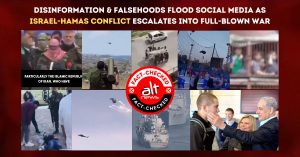“BIG QUESTION: If Sridevi died of accidental drowning who floated heart attack theory?” Times Now asked a very relevant question about the false news that was circulating about Sridevi’s death. Alt News decided to lend them a helping hand in finding the answer to this question.
BIG QUESTION: If Sridevi died of accidental drowning who floated heart attack theory? #SrideviDeathMystery
— TIMES NOW (@TimesNow) February 26, 2018
The actual sequence of events:
When the news of Sridevi’s death first broke out, cardiac arrest was widely reported by Indian media as the cause of her death. These were unconfirmed reports as the cause could only be conclusively established after an autopsy. It was no surprise therefore when as per standard procedure in such cases, UAE authorities decided to conduct an autopsy to ascertain the cause of death. However, false news about Sridevi’s forensic report too emerged in Indian media much before the report was made public. Let us look at the sequence of events:
Once it was decided by UAE authorities that an autopsy will be conducted, the timeline was not very clear. Gulf News reported that “Around 10:15 am (UAE Time) on Feb 26th, the officials at the Forensic Medicine Department announced that the final post-mortem reports of their investigation were not ready. They also briefed the representatives of the Indian Consulate that they were not in a position to give an update on by what time the reports can be released.”
At 1.30 pm (UAE Time), the Forensic report was released to her family and the Indian Consulate representative. The report was handed to the family in a sealed envelope which was to be opened in presence of the police. There was no ambiguity about the process. Gulf News stated that: “The envelope has not been opened. It has been sent to the Bur Dubai police station. Both the representatives have gone to the police station with it. Once opened by Dubai Police, and the information revealed to the family, then the next step for the process of repatriation will be decided.” Shortly after 2 pm UAE time, the report was made public and it established drowning as the cause of death.
With so much care taken about the forensic report by Dubai authorities in terms of who it could be handed over to and how it should be opened, it is indeed surprising that sections of Indian media claimed to have gained access to it hours before it was released.
How it unfolded in the Indian media:
A Times of India journalist tweeted at 10.44 am UAE time that “Forensic report says Sridevi died of heart attack in Dubai. A journalist from Hyderabad Vasudeva Rao who has been working in the Gulf for the last 14 years informed me this. He spoke to the doctors in Dubai” The forensic report had not been released at this time.
Forensic report says #Sridevi died of heart attack in #Dubai. A journalist from #Hyderabad Vasudeva Rao who has been working in the Gulf for the last 14 years informed me this. He spoke to the doctors in Dubai. #sridevideath #srideviji
— Sushil Rao (@sushilrTOI) February 26, 2018
ETimes, a publication of the Times group had made the same announcement soon after the tweet.
Forensic report says #Sridevi died of heart attack in Dubaihttps://t.co/wRFKgAO3sF
— ETimes (@etimes) February 26, 2018
At 11.32 am UAE time, much before the report was made public, Times of India tweeted that “forensic report says Sridevi died of heart attack in Dubai.” The story quoted official sources in Dubai saying, “Forensic doctors in Dubai concluded that Sridevi died of a heart attack and added there is nothing suspicious about the way the superstar passed away.”
Forensic report says #Sridevi died of heart attack in Dubai https://t.co/62naj5js5n via @etimes pic.twitter.com/OpTwcMmyEe
— Times of India (@timesofindia) February 26, 2018
How did Times of India manage to get this news before the forensic report was released? How did their “official sources” release it only to them before they shared it with the Dubai police or Sridevi’s family? Did anyone in Times of India question the authenticity of the report before circulating it on social media?
The TOI journalist who had tweeted about the heart attack theory later confirmed that the TOI article was authored by him and he also tagged the Gulf Journalist (@Vasudev95539850) who he had sourced the information from.
https://t.co/LcyEN5ny1X #Sridevi #sridevideath #srideviji @Vasudev95539850 . My report in @timesofindia
— Sushil Rao (@sushilrTOI) February 26, 2018
Soon after the Times of India report, others like Hindustan Times, National Herald and First Post also tweeted the same, without any independent verification from their end and without questioning how the news as being shared before an official confirmation. Some of these tweets are still available, though the stories have been amended to state drowning as the cause of death. In a short time, the fake news was trending.
#RIPSridevi Forensic report confirms veteran actress suffered heart attack#Sridevi news updates: https://t.co/hHPgQ6PlhT pic.twitter.com/eVA2jjFbaC
— Firstpost (@firstpost) February 26, 2018
Nothing suspicious about #Sridevi’s death, forensic report confirms heart attack: Updateshttps://t.co/WTaL5vTY8L pic.twitter.com/vP2F5M9Stg
— HT Entertainment (@htshowbiz) February 26, 2018
BREAKING NEWS
Sridevi died of heart attack, says forensic report: Sources https://t.co/CzrC59HcdU— National Herald (@NH_India) February 26, 2018
The answer to the Biq Question posed by Times Now has been traced to a publication of the same group. The Times of India story, relying on hearsay and not official sources was the source of this misleading news. It is interesting to note that the Times of India story is still available online after the autopsy report has conclusively confirmed that her death was due to drowning and not heart attack.
While we were able to answer the original question posed by Times Now, we are left with many bigger unanswered questions: Why do experienced media houses repeatedly pushout misleading news? Are there any editorial checks and balances? Is there any responsibility to apologise for the error and retract the news once it is proven to be false?
Independent journalism that speaks truth to power and is free of corporate and political control is possible only when people start contributing towards the same. Please consider donating towards this endeavour to fight fake news and misinformation.




